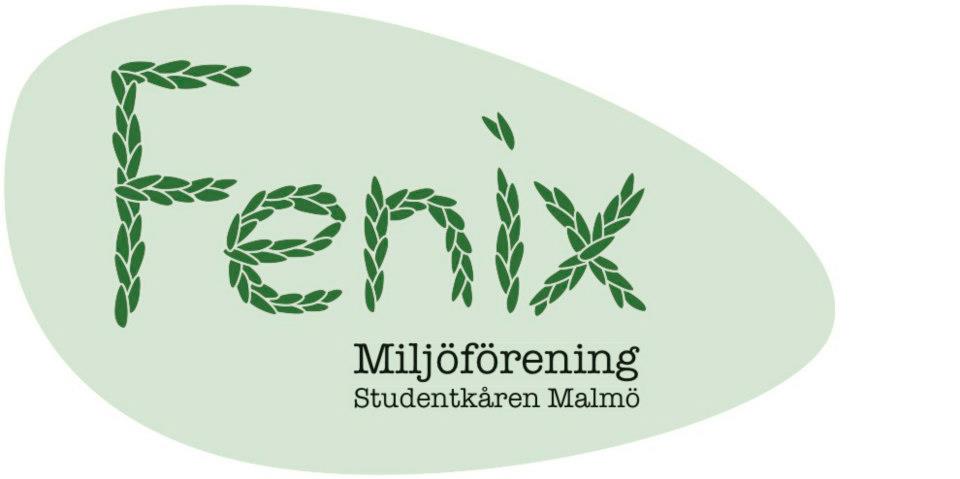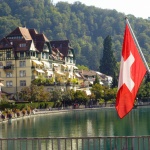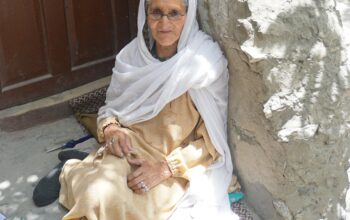
Environmental issues are real and so is the work done by the student organisation Fenix that works to promote more sustainability. From vegan dinners to cloth swapping events, Fenix puts a lot of effort into reaching people and spreading ideas.
Fenix is a non-profit student organisation at Malmö university. The organisation has its focus on environmental policy and sustainable development. Committing to the environment, sustainable development and fair trade are just some of the main goals that the organisation has.
Just a few months ago, I started attending their regularly organised vegan dinners. Curious about more of their work and events, I had an interview with Bori Yordonova, Judith Schmidt and Theresa Volbert––three young and motivated members of the active Fenix group.

Interviewer (I): I know that you work for more sustainability. What are your main goals that you focus on in your organisation?
Theresa: I would say we want to raise awareness. Especially for students about these environmental issues, but also about simple things; for example using a sustainable coffee cup instead of a paper cup. We just want to show them that there are many things you can do and that you can join to make your everyday life a little better.
I: So, you show a lot of things for individuals, really concrete things. Are you acting like role models?
Judith: Yes, that’s why we have workshops!
Theresa: Exactly! One example: Maybe not everybody is that much into vegan food but once you’ve been to the vegan dinner you get to know “Oh my god, this is all vegan and it tastes so good! Why should I not try to reduce my meat consumption?”
Judith (nodding): And I also think it is not only raising awareness, but we also want to create commitment, educate people about issues that are going on in our world and are connected to sustainability.
Bori: Yes, and we also like to provide strategies for action on a personal level. It is remembering that it is a system, we are not disconnected from one another and from the institutions we are part of.
Judith nodds and adds that another important goal they have is to have fun. The issues Fenix promotes are undoubtedly very serious, but their aim is to do it in a nice way where people can enjoy what they are coming together to achieve. Theresa explains that otherwise people can easily feel overwhelmed summarizing the common feeling: “there are so many problems but where should I start? I can’t do anything against it!”
I: So, would you say, you want to give people the opportunity to start?
Bori: Yes, we want to empower them. Because if you talk to the general population, an average citizen, he could feel disempowered because it’s a whole new world. It might be that this citizen doesn’t know anything about it. It can then feel very much like: “I can’t do anything.” That’s why, maybe next semester, we can have more fun activities. Like pub quizzes, something that is more entertaining than, rather..
Judith: It sounds like our workshops are not entertaining! (everybody laughs)
Bori: No they are! They are! And that’s the thing. You come here and you see a group of people that are trying to do the same thing! So, you don’t feel alone anymore in that kind of fight.
Just that moment, as Bori finishes her words, I remember a situation from one of the vegan dinners. I was talking to a woman who was looking very happy and enthusiastic. She told me it felt so good for her to be there at the dinner where she totally felt part of the community where veganism is treated as something normal.
And this resonates exactly with what Bori continues: “That’s the goal, to make it normal. Not to make it sound freaky or something that requires many efforts.”
I: That is a good transition to your actual events. Could you tell me more about them?
Judith: I wrote them all down, because it is a lot! You know already about the vegan dinners, which we had every other week this semester. …
And as she begins to talk about the events, I find out about so many I never even knew existed in Malmö.
Judith: We have the coffee cup campaign, and this is an ongoing event that we have every now and then.We give away free coffee to everyone that brings their own cup. We do that to raise awareness to not use single use coffee cups. Then we had an upcycling workshop, where we made our own purses out of trash. We are planning to have another one soon.
We also have different talks. The two we had this semester were one with Gram, a zero waste shop, about zero waste and one with Rude food about food waste. Movie screenings are another part of our events. The last one was a big success! It was “a plastic ocean”.

To me, society as a whole should be included in a holistic program of sustainable development. Economy, ecology and society all need to be in balance. I was wondering how Fenix was looking at this kind of approach.
I: As you said your international dinner was more about social inclusion, do you think it belongs also to sustainable development?
Theresa: Yes, exactly! Most people think it is about the trees and about the environment and about being green. If we look at the SDGs, the sustainable development goals, we find out that there are different topics. They are all connected to economy, ecology and society. So it is not only about the environment.
Bori (nodding): But the environment is our main focus. (everybody agrees)
I: It seems like you’ve done and are doing a lot! What ideas for the future do you have?
Judith: We are planning a clothes swap next semester, where everyone can bring their clothes. Then you can leave a piece and take another. This is about trying to reduce clothes consumption. Second hand clothes are just as fine as new clothes.
Theresa: And you even buy with the thought: “Okay, I can just wear it a summer and then I will buy some new stuff.” (everybody agrees)
Judith: So, we wanna change that!
Theresa: Yes, it is about changing the mindset.
Amazed by the enthusiasm and the big goals that the three interviewees are telling me about, I ask further about their ideas for the future.
I: Do you have more plans?
Judith: Yes, we do! So the next thing is that we are designing a flyer we want to put in the welcome packages for new students. There will be written some tips how you can be more sustainable in your everyday life and a few facts about sustainability.
Bori: And places to go in Malmö which offer sustainable options. This could be second hand stores, markets or restaurants.
Judith: Then we have also the soup lunch which is every Wednesday, each time organised by another student association. We already had one but we will definitely have more.
Fenix also wants to have a bigger media presence on instagram and facebook to have more students being attracted to their organisation and events. I was even introduced to the plan of having short youtube videos of all the events Fenix has; a plan to produce some entertainment while spreading their ideas. In my interview with Fenix I learned that they want to expand in general: having more discussions, more lunches, more everything.
The interview was slowly coming to an end, so I wanted to use the final chance to find out a little more about my interviewees by asking my last question.
I: What are you personally changing to contribute something for a better world?
Theresa: For me it’s like breaking the big, global challenges into smaller things on the local scale and then trying to implement it in your everyday life like using a reusable coffee cup, trying to reduce your waste production, your meat consumption. And then it is about finding people who have the same mind and share the common goals. Together you can take it up to a bigger issue and then try to create a change. I am a nature lover and I want to keep that!
Bori: That’s actually one of the biggest motivation for people, if you point at what kind of benefits the nature has. You know, whether if it’s going up in the mountains or having clean oceans or clean air in the cities. People want to keep this, so that’s something that motivates them.
I really don’t support this kind of approach in which you are more negative or trying to judge. I would much rather have a curious discussion with someone and see where he or she struggles. Just coming from my own experiences, I am trying to support them. I hope that I can be more of the side of education and that I can manage getting people together for the cause.
It is very important to remember that we are not alone in all this and that we have to fight this with communal efforts instead of being lonely soldiers. Just build those communities that believe that there is a way out of the mess.
Judith: Wow, it is hard to add something to that! You absolutely nailed it. I can then maybe say what it means to me to be sustainable or to make a change. For me it is, if I put it in one sentence: Trying your best.
I: Thank you for these words! I especially like that you say that it is about trying.
Theresa: You can’t change yourself within one day by for example going to zero waste. That’s impossible. But if you just challenge yourself every day, you will change.
Judith (nodding): Yes, you cannot change all of the points.
Theresa: Exactly! But the more you get to know about the whole issue and the more you talk about it with other students, the more opportunities you discover.
Judith: And it is a really good feeling just knowing you are not alone, that you are not the only one trying to not destroy the world. And it’s a good feeling. You know you are making a difference!
I was grateful for this summarization by my intervewees: it showed me that they as individuals have the same goals as the whole organisation has. To me, this is the base for every group that wants to achieve something and reach people with their messages.
Fenix needs this base since the organisation has big plans. They do not just want to have more events like lunches, movie screenings and a bigger media presence. An even bigger plan is to become an NGO (a non governmental organisation), so Fenix would not be a student organisation anymore but an official organisation that is supported by the Swedish government.
Their mission to make sustainability something normal will not change but the frame around it will hopefully help to reach a bigger audience and spread their enthusiasm about having a more sustainable and better world soon.
Check out Fenix’ facebook channel “Fenix Miljöförening” or instagram page “fenix_miljoforening_malmoo” and get inspired!
By Judith Roos
Photo credits:
Featured image: Vegan Dinner Nr. 3, James Morrison- Knight, all rights reserved
Image 1: Logo Fenix Miljöförening, Fenix Miljöförening, all rights reserved
Image 2: Interview with Judith, Theresa and Bori, Judith Schmidt, all rights reserved
Image 3: “Coffeina”, James Morrison- Knight, all rights reserved
Image 4: Zero Waste event with Rowan Dury, James Morrison- Knight, all rights reserved








